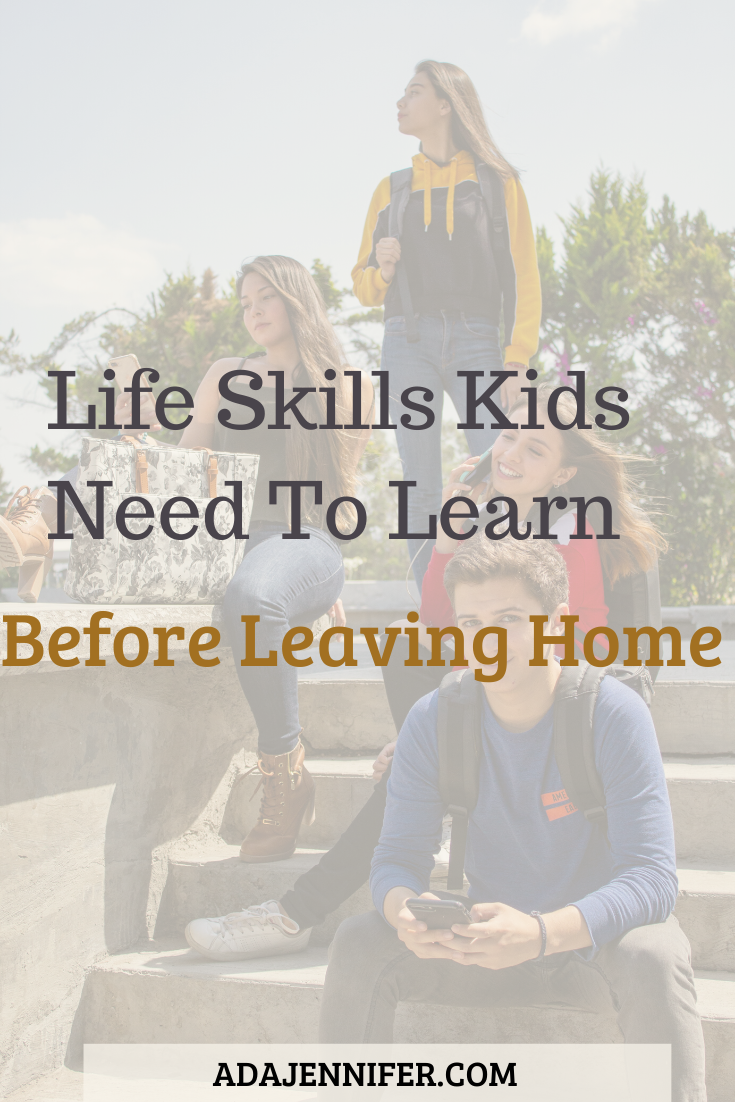91 Life Skills Kids Need To Learn Before Leaving Home

There are some important life skills kids need to learn before leaving home. Why learn them?
Life is not all rosy, it has its fair share of challenges. Having the necessary skills for life, makes all the difference.
As parents, we must teach our kids, to help them overcome and sometimes adapt to the many challenges life could throw their way.
When I was growing up as a child, one of the rules in my house was for every child above age 12 to cook.
I was initially unhappy that my parents made learning these skills compulsory so that whenever mama was in the kitchen, I had to also be there to watch and assist. But over time, it became a routine and I started cooking and doing kitchen chores effortlessly.
Life skills are abilities necessary for full participation in everyday life. They enable us to deal effectively with the demand and challenges of life.
Over a decade ago, as a young girl living with my parents, I learned my life skills. Now as a wife and mother, I find these skills even more useful as I build my family. I watch with amusement my 16 months old son’s increasing interest in domestic chores. Kids are incredibly quick in learning; able to learn anything we teach them.
As parents, we must make conscious effort to impact our kids lives positively by equipping them with the tools they need for their life journey.

91 Life Skills Kids Need To Learn Before Leaving Home
1. How To Cook
According to research, people who regularly eat homemade meals, consume fewer calories and eat healthily. Teaching kids how to cook means preparing them for a healthy lifestyle in the future. Also, homemade meals are less expensive than prepared foods, so grownups who can cook have the ability to keep their food budgets in check and save.
2. How To Manage Money/Financial management

This is an essential life skill parents should teach their kids because it is needed in all of the life dealings. This skill teaches kids how to be disciplined and resist the urge to buy things they don’t need. It teaches them to invest in their future and handle debts. Parents can start teaching kids about money as soon as they can talk.
Teach your child how to develop a monthly budget and live within their means. This essential skill is rarely taught in school, so it’s important to ensure your child knows how to manage their finances.
Teach them how to save up for the future and any other unforeseen emergencies. Don’t forget to tell them about all the kinds of insurances that there are.
3. How To Communicate With People

Communication is one thing that will feature in all the activities our kids will be involved in all through their lives. We need to equip them to effectively communicate with people and make their positions on issues clear. If your kids are shy when they are with people and find expressing themselves difficult, teach them to be confident in themselves and to express themselves freely.
4. How To Plan Their Time
Kids need to know that time should be spent doing productive things and not wasted. As a parent, teach your kids that to manage their time, they need to prioritize their tasks and stop procrastinating.
If, for instance, your kids want to watch their favorite program on television when they are supposed to be doing their house chores, teach them to learn to assign time to their activities for the day and to prioritize the activities that are important above those that are not so important.
Also, they can reduce distractions by shutting off their phone and social media when it is necessary. Most of all, they should be encouraged to follow a daily schedule that lets them make maximum use of their time.
5. How To Be a Self-starter
Being a self-starter means you don’t need someone else to make decisions for you or take steps for you to make advancements or improvements in life. It means you want to get things done for yourself and you don’t have a laid back mentality. As parents, we should teach our kids to be self-sufficient, so they don’t grow up to be adults that can not do things for themselves.
6. How To Stand Up For Themselves

As parents, we have to teach our children to be able to stand up for themselves. They might encounter people who want to bully or take advantage of them. They should be equipped to know how to deal appropriately with such issues and not always wait for Mummy and Daddy to come to their aide.
Also, we have to teach our kids to be confident in themselves and express themselves freely. To effectively do this, we should always encourage our kids to be confident in expressing what they think, and correct them with love when necessary. Remember not to yell at them as it makes kids withdrawn and could eventually contribute to these kids having low self-worth and inferiority complex.
7. How To React To Failure
Life has its highs and lows. There are times when we win and others when we lose. We should teach our kids to know that if for circumstances beyond their control they fail, they are not failures. Rather they just didn’t do things right, so they should be encouraged to improve on themselves and do better in the future.
8. How To Be Organized
Life is better when it has a sense of orderliness to it. Some kid are by nature, organized while others aren’t. It is our duty as parents to help our kids stay organized. We can do this by Making checklists for them, to see if they have been able to carry out the tasks they were assigned or we can encourage them to make to-do lists for themselves under our supervision. We can also create fun memory aids and teach them time management skills.
9. How To Wash Their Clothes

Kids need to learn to wash their clothes, so they don’t become dependent on other people to do this for them. Encourage them to wash their clothes when they are dirty and dry them.
10. How To Do House Chores

You can encourage your kids to do house chores by making them accountable to you. Assign chores to children, and see to it that their chores are done.
11. How To Save Money
Teach your kids not to be wasteful. Let them know that money is earned and should not be wasted but invested. You can do this by opening bank accounts for your kids and encouraging them to save some of their money so that after some time when they have saved enough, they can buy nice things for themselves or invest in a meaningful project.
12. How To Maintain Cars And Drive Safely
A car is a medium of transportation. We have to transport ourselves to places from time to time. So, learning to drive cars is an important life skill for everyone. We, however, should never hand over car keys to our underage kids. We should only teach driving to our kids when they attain the right age. Before teaching them, we should show them the parts in a car and teach them basic car maintenance.
13. How To Swim
Swimming is an enjoyable and recreational sport. Encouraging our kids to learn this life skill is important because it is a good form of exercise, but more so because it could be their safety ticket if for some reason they get trapped in a water body.
14. How To Use Public Transport
Parents whose kids are accustomed to been driven in private vehicles should encourage their kids to also try out public transport. That way, they get to meet people and learn to interact and find their way around when their parents are not there.
15. How To Find A Job
Teach your teenage kids how to write a resume, dress for a job interview and answer interview questions confidently. Encourage them to work during their holidays if possible. This way, they get work experience that will help them later in the future.
Save For Later

16. How to sew/seam

Clothing mishaps are common— it would be stupid to throw a perfectly fine shirt just because of a fallen button. While it might seem insignificant, your parents do most of your chores.
Living apart, it would be necessary to learn basic household responsibilities. Now that you are moving out, you must learn to fix a hole in your favorite top or stitch a fallen button.
17. How to find peace in solitude
Solitude can be lonely for many people, and there’s nothing wrong with that. If your kid is moving out, they will probably live alone or with a roommate for a while, at least. Teach your child to feel comfortable in their own company. This will come with time.
18. Confidence
Build your child’s confidence and show that you trust them in making their own decisions. Show confidence in their ability to live alone and know what is best for them.
19. Trust in themselves

This is not something you can teach your child overnight, so you might want to get started early on in life.
Give your child the freedom to be an individual and trust themselves. Know that they know what is best for them, and if they ever falter, you will be there to help.
20. Iron their clothes
As easy as it may sound, teach your child how to fold and iron their clothes properly. Also, teach them how to store their clothes organized in the cupboard, so it isn’t a mess every time they try to find something to wear. Decluttering and organizing skills will make their life easier.
21. What Credit Score And Credit Reports Are
If your child ever has to take up any debt, their credit score determines their ability to pay back that money. Explain to your child how credit scores and loans work before they move out so they can understand the system before applying for student or any other kinds of loans.
22. How to apply for a job
When your child moves out, initially, they might be dependent upon you for financial assistance until they find a job. Help your child understand the process of how to fill out a job application and anything else the process entails. Teach them how to dress for interviews and look presentable.
23. How to read a map
Teach your child how to read a map that is on paper. With a rise in technology, youngsters rely on it more than adults. Make sure your child knows how to read a map without the help of a navigation app.
24. How to deposit a cheque
Once your child has moved out, they must know how banks and cheques work. Depositing a check can be quite a hassle, so it is recommended that you teach your child how to do so well in advance.
25. How to travel alone
Traveling alone may be tough for some people as it requires them to be attentive at all times. Teaching your child how to travel alone and figure out routes will give them an upper hand when it is time to travel alone.
26. How to write a resume
A resume is essential for job applications. When you teach your child how to apply for a job, you must also teach them how to write a resume in proper format and use these skills efficiently to get a good job.
27. How to use a dictionary
If your child has decided to move to another country, this point is especially relevant. Teach your child how to read a dictionary. It’s even better if they know a little language of the place they are moving to.
28. How to pay a bill online.
When your child moves out, they will have to take the responsibility to pay bills and be independent. Teach them how to pay their bills before they move out to be ready for the process when the time arrives.
29. How to change a tire
Imagine this, your child goes out in the car and gets stuck somewhere due to a flat tire. They might have an extra tire, but they might not exactly know how to change it. Sounds scary, doesn’t it? It is important to teach your child how to change a tire in an emergency.
30. What to do in case they lose their phone.
It doesn’t matter how old you are; we are all somewhat dependent upon technology like cell phones and the Internet to help us in emergency cases. Teach your child what they can do and how they can travel back home from somewhere using public transport if at all they were in a situation where they do not have access to their phones.
31. How to use the ATM
When managing finances on their own, people have to learn how to use the ATM card and withdraw or deposit money with the help of a card.
32. How to use a debit or credit card
The difference between a debit and a credit card is significant and must be taught to your child. Before they move out, make sure they know which one to use for what kind of shopping.
33. Carry an ID always.
Just let them know the importance of carrying identity proof at all times with themselves, especially if they are moving to a different country. It’s even better if they remember their security codes.
34. How to fill out a money order
This point is also related to knowing the basic skills required for finance management. Learning how to fill out a money order will help them a great deal when there is a need to do so.
35. Take care of yourself.
Teach your child what they can do to take care of themselves. Whether it’s simply a face mask night or just a little treat once in a while, tell them it is okay to take care of themselves and put themselves first. Self-love goes a long way in preventing the feeling of loneliness, even when one is alone.
36. Conduct around authorities or dignitaries
Parents or elders can teach the appropriate way to behave in front of others. If your teenager is moving out, tell them how they must dress and act around authorities or other people that they respect when they meet them.
Along the way, don’t forget to teach them that respect goes both ways, and authority isn’t there to scare you but to assist you.
37. How dating works
Many parents might hesitate to have this conversation. Still, you should know that this is an important topic that must be addressed. Tell your child how dating works and everything else it entails.
Teach them the correct way to love someone— non-toxic, free, boundless, envy-free, loving interactions, and supportive.
38. How to get the right knowledge about sex
Have “the” talk with your child before they move out. Ideally, this must be done way earlier. But if you haven’t yet, now is the time. Explain to them how the human body functions and how they can be intimate with someone with necessary precautions.
Whether a girl or boy, explain to them the importance of consent.
39. Stress Management
Living alone is a stressful situation. Help your kid know how to deal with this stress by trying relaxation techniques such as yoga. Also, let them know that help is always available whenever required.
40. Independence
This point goes without saying. If your child is moving out, it means they are ready to be independent. They must learn how to depend on themselves while at the same time being strong enough to ask for help when necessary.
41. How to fill out medical forms
For this, your child must be well informed of their medical history. Teach them how to fill medical forms that they might have for healthcare purposes or otherwise.
42. How to write a professional email
When applying for jobs and sending emails to potential employers, a simple “hey!” might seem informal. Teach your child how to address official emails and draft them as well.
43. Negotiation skills
Let your child learn how to negotiate. This will help them in other skills like time and financial management— where they must learn how to divide their time and resources accordingly.
44. Conflict Resolution
Conflict can happen at any time, whether it’s one’s workplace or school. Conflict resolution is an important skill for everyone to have. It helps one understand the difference between healthy and unhealthy conflict and figure out ways to deal with them.
45. Organizing

Organizing is one skill that goes a long way when living independently. Your kid must know how to efficiently organize and utilize the resources available for them. For instance, time, money, or even their wardrobe!
46. What the world is about
Give your child a fair idea about your perception of the world before they move out. While doing this, you must be extremely careful to not paint their perspective of life but simply help them understand what the world means to you and where you’re coming from.
47. What matters
Children are often taught that their grades or looks define them from a young age. It must be made clear to a child right then that their worth does not depend on how they look or how much they score in exams. Before anything, raise your child to be a good and kind human.
Don’t inflict their value on how much they earn or their abilities. Instead, put their value in their individuality and existence. Teach them to be happy before everything.
48. To accept help
Many people love helping others but may struggle to ask for help themselves. If you notice signs of hyper-independence in your child, let them know that it is okay to ask for help. Listen to them whenever they address personal issues and tell them that professional help like therapy sessions is always available.
49. How to keep themselves entertained.
If your child has hobbies, encourage them. Your child must know how to keep herself entertained by simply reading a book or just listening to music since they might have to be alone a lot once they move out.
50. What to do in case of emergencies
If your adult child is ever stuck somewhere or has to deal with some problem that they cannot handle by herself, guide them through it.
Let them know of all the emergency contacts available in case of major issues. Also, let them know you’re there for them, even if it’s not physically.
51. How to avoid unnecessary drama
Drama can be a part of many people’s lives but teach your kid that it is best to stay out of everyone else’s business and mind their own. This will help them avoid problems or get stuck in situations they might not have complete control over.
“live and let live.”
52. Maintain their individuality
Before your child moves out, make sure they know you value and love them for who they are. They should know this from the very start of their life as this can greatly help boost confidence and self-esteem.
When you tell your kids they are loved for who they are, you’re encouraging them to do more things they like doing that make them themselves.
53. How to shop for themselves
If you’ve always shopped for your child when they were growing up, now’s the time to hand over the shopping reins to them.
Let them decide what they want to wear and what kind of clothing they want to shop for. They’re moving out to live independently at the end of the day, and you must understand that.
54. How to take responsibility for their mistakes
From the start of their childhood, teach your child how to take responsibility for their mistakes. Don’t yell at them or scold them if they make a mistake. Instead, gently tell them what the consequence of this mistake could be and why they must restrain such behavior.
This will help them take responsibility for their actions instead of playing the blame game. When your child moves out, they will learn from their mistakes and move on with a lesson.
55. How to take criticism
The most essential part of taking criticism is realizing where the criticism is coming from. Is it coming from a good place or a bad one?
In deciding what criticism to take seriously, believe in the quote, “Don’t take criticism from someone you wouldn’t take advice from.”
Teach your child how to take positive feedback and use it to be a better individual.
56. How to maintain personal hygiene
This may sound like common sense, but tell your child how to maintain personal hygiene. How often should they shower, and how they should be applying deodorant every day. Yes, even that!
57. How to meal plan
You should teach your children how to balance their meals and cook them at home instead of buying food from outside. Planning meals well in advance will help them maintain a balanced diet and stay healthy.
58. Know the phone number of emergency contacts (other than parents)
In case of an emergency, your child needs to know the contact of people they trust to help them. Accidents may occur without warning, and in cases where required, help must be a call away.
59. What are loans and interests?
Loans may sometimes become essential for helping a child deal with school or other investments. However, parents should provide the right information to help kids differentiate and understand which kind of loans they should go for and which ones they should avoid. As a parent, also teach them how to get out of debt when finances get tough.
Parents must also teach their children what interest rates are and how they work before their child moves out.
60. What to do when they fall sick
If you’ve always been around to help your child when they have fallen sick, even just a little, you might want to teach them how to deal with sickness on their own.
You must teach your child what they should be eating and how to get medication prescribed by a doctor if and when necessary.
61. Learn their home address
No matter what part of the country your child moves to or even if they move to the next neighborhood, they must know their home address. There are multiple reasons why this is important. One of the main ones are:
- Your home is what is linked to your social security number.
- Bills and important documents should be mailed to your child’s registered address and not yours.
62. Table manners
This may seem simple, but teach your child how to have table manners and conduct themselves while eating food in public spaces.
63. How to show gratitude
When it comes to showing gratitude, many of us seem to have trouble. Teach your child to be grateful when someone helps them.
Gratitude also helps create a feeling of belonging and decreases stress in people. The best way to teach your child gratitude is by being a model. Show gratefulness in everything you do, and your child will pick up this value in no time!
Looking for a silver line in every situation is also part of showing gratitude and making the best of your circumstances.
64. How to be kind to others

While kindness may be considered more of a value than skill, we believe it is essential that every person learn how to be kind.
Kindness can go a long way in forming social relationships and even help one’s self-image. By teaching your child how to be kind to others, you’re teaching them how to be kind to themself.
65. How to be kind to themselves
We often beat ourselves up for the mistakes we’ve made in the past. Be a role model for your child and teach them that it is okay to feel bad about the mistakes they’ve made and to take responsibility for these mistakes.
However, what is not okay is blaming yourself and feeling too much guilt for your errors. Remember, to err is human.
66. Basic first aid
One can never be too careful. Teaching your child basic first aid will help them in accidents or emergencies. They might also be able to help others whenever the incident occurs, and basic first aid is necessary for injured people.
67. How to deal with change
Change may be good or bad, depending on your perspective. A parent must always teach their child to look on the brighter side of change; this does not mean that they must always be positive.
Teach them that it is okay to feel some anxiety and fear when dealing with change and let them know that they are strong enough to brave through the change and emerge as their best self.
68. Self Defense
Self-defense is a skill that goes a long way in ensuring your kids can protect themselves in case any dangerous situation emerges. They must know what to do to safeguard themselves.
69. How to use a fire extinguisher
Fire extinguishers are more effective if the person using them knows how to accurately use them and hold them properly to aim in the right direction.
Teaching them how to use a fire extinguisher will also reduce their chances of getting injured while using one if they have to. There are also different kinds of extinguishers, so your child must know which one to use in what situation, or the flames could get worse with the use of the wrong extinguisher.
70. Know the closest medical centers/ hospitals
This point is also relevant in cases of emergencies. When your child knows what hospital is closest to their home, they don’t have to worry about looking it up on a map.
71. How to put out a grease fire
If your child is only now learning to cook, a grease fire may become a common occurrence. Small fires that are caused in the oven or on the stove can be contained without the fire department’s help.
Teach your child how grease fires can be eliminated with the help of salt or baking soda and that they shouldn’t pour anything that splashes onto a fire like that. They can also use a metal sheet to help contain the fire first.
72. How to make appointments
For most of us, our parents made appointments to see doctors or other professionals. This may change once your child moves out, so they need to know how to fix an appointment with the person they want to visit.
Teach your child how to look for a number online and place a call or find an email id they can contact to make an appointment with the concerned professional.
73. How to check a vehicle for an oil change
Excessive noise or shaking while idling are signs that your vehicle is due for an oil change.
Teach your child what the importance of timely oil changes is. Tell your child to make sure their engine is turned off first before using a dipstick to check the level of oil in the vehicle.
74. How to grocery shop alone
Grocery shopping alone is different from grocery shopping with a friend/sibling/parents.
If you have more than one kid, they would go grocery shopping together and divide the list items to look up and bring to the shopping cart. Even if you took your child grocery shopping, it might be that the both of you divide the items to look for.
When going grocery shopping alone, teach your child to make a list and go in order of the items written to make sure they buy everything they need. Also, teach them to not splurge on things they might not necessarily need, especially if they live on their own.
75. Knowing the why of physical changes
Keep your child informed of the physical changes they might grow through and how it’s common in every individual. You must also inform them why their body is going through such changes and their purposes.
76. Social media etiquette
Conducting oneself on social media is often undermined. Teach your child what acceptable and unacceptable behavior on social media is.
For example, commenting under someone’s picture about how beautiful they look is acceptable, but commenting on someone’s body is unacceptable, though quite common online.
77. How to speak up and become assertive

How to be assertive is a skill rarely taught to many people. Children are often taught that agreeing with whatever the other person has to say is a sign of respect.
This is not true; you must teach your child how to be assertive and speak up in situations where they need to.
78. Healthy disagreements are okay.
In a healthy disagreement, both parties respect each other’s opinions despite having a huge difference in perspective. Teach your child to respect the other person’s opinion even if they may not necessarily agree to it.
79. What is the medical power of attorney?
A medical or healthcare power of attorney is the authority you can give to someone else to make decisions about your health if you are incapable of doing so.
This is an important skill for your child to understand who they would want this person to be for them.
80. How ‘Will’ work
Will is a legal document that holds all your wishes and the distribution of assets amongst family/friends in case of death. Your child needs to know what a will is and how their parents’ will work.
81. How to navigate through their emotions
Teach your child that it is okay to feel emotions and understand why they feel the way they do. They must know how to navigate through their feelings and understand them. This skill is also called emotional intelligence.
82. How to give themselves the space they require
Before you teach your child how to maintain their own space, teach them that it is okay to take up space. Even if you might feel that this comes naturally, tell your child that they deserve to have good things and that they must take up space whenever necessary.
83. How to deal with imposter syndrome
Imposter syndrome stems from a psychological pattern in which individuals believe they are not good enough no matter what/how much they achieve. They might also undermine their abilities, skills, and talents.
The best way to deal with this pattern is to start young. Teach your child that they deserve all the good things in life and are worthy of whatever they wish to achieve from a young age.
84. How to invest in stocks/ trade
The trade industry is growing, and this skill must be taught to all young people for good financial tactics. Trades are a way of making money by investing in the right business. Teach your child how to identify these businesses and get extra finances.
85. How to balance a checkbook
This is part of the many financial skills a child needs when moving out. Teach your child easy and simple steps to make sure they are interested in the subject and explain how it will benefit them in the long run.
86. How to wash dishes
Washing dishes is a good part of maintaining household hygiene. Teach your kid from a young age to do their chores so when they have to live on their own, they know how to do them and don’t have to start from scratch.
87. How to keep a plant or a pet alive
Many people get plants or pets without being fully ready to take on the responsibility. Help your child understand that if they want to have a plant or a pet, they must learn how to take care of them.
They must know how to water a plant— provide it with adequate fertile soil and sunlight and also take care of a pet by feeding it on time and taking it for walks regularly (in cases of dogs or cats).
88. How to unclog a drain
Basic plumbing skills are a must-know for a child moving out of their house. Plumbing can be expensive, so this skill is a life-long one you can teach them.
89. How to jump-start a car
Using jumper cables is fairly easy. They may have car mechanics available to help, but this skill can be used to save up some extra bucks.
90. How to be punctual
Being punctual is a skill everyone must know. The hack to this skill is waking up and getting ready earlier than just 10 minutes before it is time for you to leave. Teach your child to never be late in school or class; as they grow up, this will become a habit.
91. How to say no
This is one of the most important life skills kids need to learn before leaving home and it must be taught at a young age.
Teach your child how to say no and be okay with it. Teach them not to feel guilt in putting their own needs first and how it is better for them in the long run.


This post is worth everyone’s attention. How can I find out more?